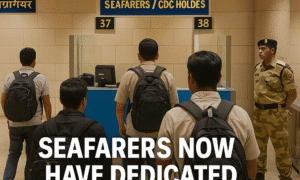The life of a seafarer is unlike any other. Months away from home, limited access to the internet, long working hours, and the emotional toll of isolation all add up to an incredibly challenging lifestyle. In such a tough environment, even small things—like having a quiet drink with fellow crew members after a long shift—once provided some sense of normalcy and relief.
But in today’s shipping industry, those moments are gone. A growing number of companies have adopted zero alcohol policies. No drinking onboard. No returning to the vessel after shore leave with even a trace of alcohol. And this is happening not because everyone was drinking irresponsibly—but because one or two people did.
One Person’s Mistake, Everyone’s Punishment
This is the heart of the frustration felt by many at sea: “Why should I suffer for someone else’s actions?”
Let’s put this into perspective. Imagine if road safety officers applied the same logic. A few drivers caused accidents due to reckless behavior, so in response, authorities banned all vehicles from the road—even from responsible drivers. It would be outrageous, right? Yet, that’s how many seafarers feel today.
Unfortunately, this is how it works at sea. One seafarer causes a scene while drunk or creates a safety concern, and instead of dealing with that individual, the company chooses to enforce a total ban. From a management point of view, it’s the “safest option.” From a seafarer’s point of view, it feels like collective punishment.
The Missing Human Side
A ship isn’t just a workplace—it’s also a home, a social environment, and a mental battleground. Many seafarers struggle with loneliness, depression, and anxiety. In the past, socializing over a drink after duty hours helped relieve some of that tension.
Now, even that is off-limits—without any proper alternative support. No structured recreational programs. No real-time mental health resources. Just more rules.
The message seems to be: “Trust no one, treat everyone as a potential risk.”
Safety Is Crucial—But So Is Balance
Let’s be clear—safety must always come first. No one is arguing in favor of drunken behavior at sea. But the issue is how it’s being handled.
Instead of a zero-tolerance blanket policy, could there be a more balanced and respectful approach?
- Allow limited and monitored consumption during off-duty hours for those who wish to drink responsibly.
- Set clear boundaries: zero alcohol while on duty or within a certain number of hours before a shift.
- Focus on education and accountability, not punishment.
- Provide better mental health support, wellness checks, and recreational activities onboard.
- Differentiate between irresponsible drinking and minor consumption during shore leave. Returning after having a casual beer with dinner shouldn’t be treated like a criminal offense if behavior and sobriety are intact.
A Call for Empathy
Policies should be designed not only to reduce risk, but also to respect the dignity and well-being of those who follow them. Seafarers are professionals, not children. Trust, support, and understanding must accompany rules and regulations.
Yes, mistakes have been made. But the answer isn’t to strip away all freedom—it’s to handle those mistakes responsibly and fairly, while maintaining the mental and emotional health of the crew.
After all, a mentally strong, respected, and trusted crew is far safer than a resentful one under rigid control.




Leave a comment